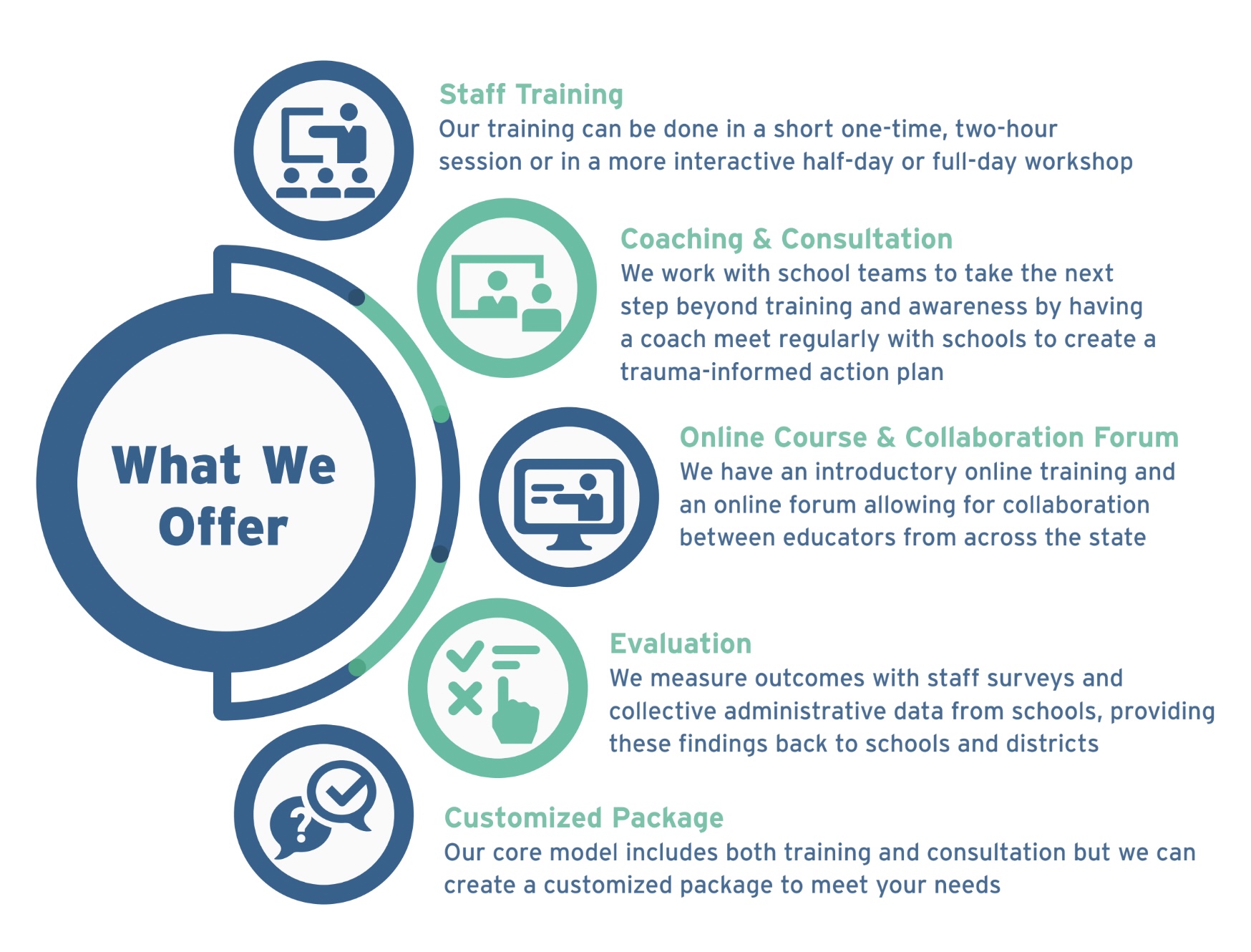Overview
The North Carolina Center for Resilience and Learning is a whole school, whole child framework working with districts and schools across the state to create trauma-informed learning environments that are safer and more supportive for ALL students. The Center aims to build understanding and awareness about trauma, stress, and their potential impacts while also helping schools focus on resilience, support, and safety for their staff and students.
To do this, our model provides two core components:
- Professional development for educators on trauma and its potential impact on student learning as well as school-based strategies for building wellness and resilience for staff and students.
- Ongoing coaching and technical assistance for a core team within a school to support moving past training and awareness and into action. Our coaches help schools to create and implement an action plan of resilience-building strategies tailored to the needs of their students, staff, and community.
The Details

Becoming a trauma-informed school is a process that takes time and requires intensive professional learning and coaching. The Center works closely with districts and schools to deliver experiences and coaching that aligns with your goals and vision. Our work aims to create systems-level change by shifting the culture and mindset of an entire school so that staff begin to see a child’s behavior in the context of their life experiences, in consideration of possible trauma history or stress response system triggers. This helps educators shift how they approach things like discipline and social-emotional learning (SEL) in ways that ultimately create safer and more supportive environments in the classroom.
Our Professional Learning & Training
Our whole-school training provides condensed information to ALL staff in the building (administrators, student services staff, classroom teachers, teacher assistants, bus drivers, cafeteria staff, custodians, and all other support staff). This broad training fosters unifying language, understanding, and expectations to promote climate and culture change, and helps staff recognize the neurobiological foundations of students’ disruptive behaviors. Our training includes:
- Defining a trauma-informed school
- The research behind trauma and Adverse Childhood Experiences (ACEs)
- The impact of trauma on brain development
- Toxic stress and the stress response system – how stress and trauma often show up in the school setting
- Discussing resilience and resilience-building strategies for schools in the areas of:
- Staff wellness, both self-care and collective care
- Building relationships and connection
- Establishing structure and routines
- Self-regulation skill-building and social and emotional learning (SEL)
- Culturally responsive teaching practices

Our Coaching
Across the year, a Center coach is present in each school every other week. After the initial staff training, the coach works with the principal to establish a steering committee, called a Resilience Team, composed of 5 to 10 staff members representing different positions and roles across the school. The goal of this team and the Center coach is to help take the trauma-informed work to the next level beyond training and awareness and begin to create and implement positive change. During the coach’s time in the school, he/she will observe school challenges and successes, meet with the Resilience Team, brainstorm solutions to emerging problems, coach problem-solving strategies, and provide implementation support. This coach provides access to resources and helps team members maintain their focus on the core principles of the Center.
The Resilience Team begins considering their school-specific urgencies, which may include things such as: behavior, attendance, or achievement. The team then starts an action planning process to select priority trauma-informed strategies to target change. Examples of possible strategies include school-wide social-emotional learning curriculum, morning meetings, calm-down spaces, staff wellness lounge, a check-in/check-out program, or models targeting school climate and discipline such as restorative practices. The coach works closely with this team to create, implement, and monitor their school-specific action plan.
The goal of this model is not to feel like “one more thing” for schools who already have so many programs, initiatives and other requirements on their plate. The journey of becoming trauma-informed is all about creating a mindset shift in staff and culture shift across the school so that everything the school does is done through a trauma-informed lens.
Full List of Program Offerings
In addition to our core model that includes year-long intensive professional learning and coaching, we also have a wide range of other program offerings and partnership opportunities. If you are interested in learning more about how we may be able to partner with your school or district, complete our interest form here. We are always happy to customize an option for you by setting up a meeting to discuss what you are looking for and putting together a proposal and a scope of work to share with you.
